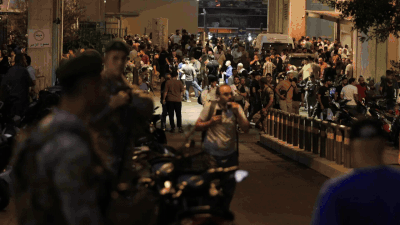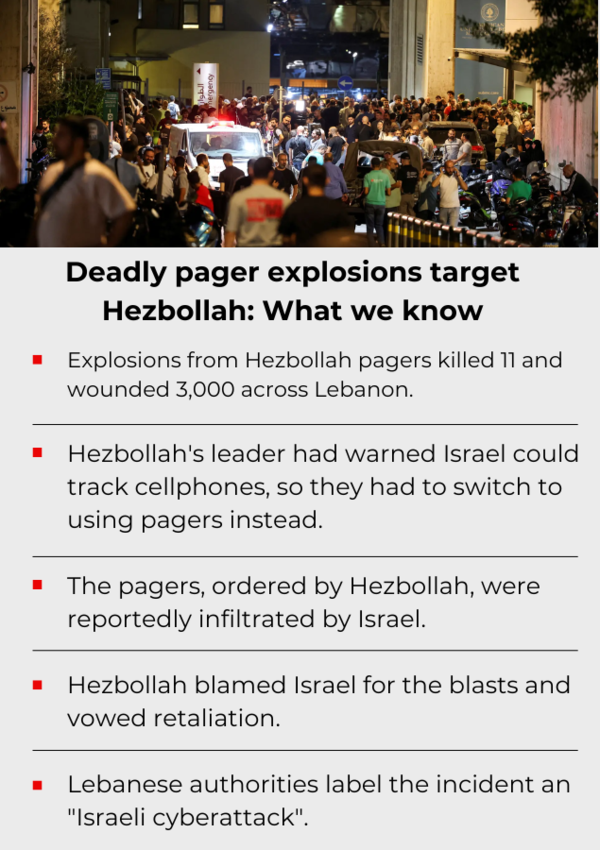- News
- World News
- Middle East News
- How Israel's Mossad turned everyday pagers into deadly weapons against Hezbollah
Trending
How Israel's Mossad turned everyday pagers into deadly weapons against Hezbollah
Israeli operatives secretly placed explosives in pagers used by Hezbollah, leading to an attack that killed at least nine people and injured over 2,800 across Lebanon. The devices were triggered remotely through a coded message. This operation marks a significant intelligence failure for Hezbollah, which has vowed retaliation against Israel.

Thousands of modified pagers turned into instruments of destruction in a deadly attack against Hezbollah on Tuesday. Israeli operatives had embedded explosives in these pagers, which were originally intended for Hezbollah’s communication network. When the devices received a seemingly routine message, they detonated, causing the deaths of at least 11 people and injuring over 2,800 across Lebanon.
The pagers, manufactured by Taiwan-based Gold Apollo, were initially intended for low-tech communication among Hezbollah fighters, who sought to avoid detection from advanced tracking systems.
The operation centered on the strategic deployment of 5,000 Taiwan-made pagers, procured by Hezbollah months in advance. These devices, modified by Israel's Mossad, were embedded with a small amount of explosives, Reuters reported quoting sources. The modification included a remote-trigger mechanism that was activated by a seemingly innocuous message received on the pagers.

On Tuesday afternoon, the pagers received a coded message that appeared to be from Hezbollah's leadership. Instead of conveying instructions, the message triggered the hidden explosives within the devices. The simultaneous detonation resulted in widespread chaos and destruction, impacting not only Hezbollah members but also Iran’s envoy to Beirut.
Read also: 1000s of pagers explode across Lebanon, many Hezbollah fighters hurt; 9 dead
The explosives, concealed within the pagers, went undetected despite months of use. The precise details of the attack were revealed by a senior Lebanese security source who described the embedded explosives as difficult to detect with conventional scanning methods.
In response to the attack, Hezbollah has vowed retaliation against Israel. The scale and effectiveness of the operation have been described as one of the most significant intelligence failures for Hezbollah in recent years. Jonathan Panikoff, a former US national intelligence officer on the Middle East, labeled it as “the biggest counterintelligence failure Hezbollah has faced in decades.”
Following the attack, Hezbollah has promised retaliation against Israel, labeling the incident as “Israeli aggression.” Lebanese information minister Ziad Makary condemned the attacks, while a Hezbollah official stated, “Israel will receive its fair punishment” for the blasts.
The group confirmed that among the casualties were its fighters and civilians.
"This is not a security targeting of one, two or three people. This is a targeting of an entire nation," senior Hezbollah official Hussein Khalil said.
US denies involvement
The United States denied any involvement or prior knowledge of the explosions in Lebanon. During a press briefing, state department spokesperson Matthew Miller said that the US is currently collecting information about the incident but was unaware of it beforehand and played no role in it.
"We are gathering information on this incident. I can assure you that the US was not involved and had no prior knowledge," Miller said.
When pressed for details about the information being collected, he noted that the US is seeking facts similarly and reiterated the United States' commitment to seeking a diplomatic resolution.
"We continue to collect information. I don't have any public readout. We are collecting information in the same way that journalists are across the world to gather the facts about what might have happened," he said.
"Our overall policy remains consistent, which is we do want to see a diplomatic resolution to the conflict between Israel and Hezbollah. We want to see one that allows the tens of thousands of Israelis who have been displaced from their homes and tens of thousands of Lebanese who have been displaced from their homes to return home," Miller added.
The pagers, manufactured by Taiwan-based Gold Apollo, were initially intended for low-tech communication among Hezbollah fighters, who sought to avoid detection from advanced tracking systems.
However, Israeli intelligence agents managed to insert explosive components into these devices at the production stage. The pagers were then distributed to Hezbollah under the guise of standard equipment.
The operation centered on the strategic deployment of 5,000 Taiwan-made pagers, procured by Hezbollah months in advance. These devices, modified by Israel's Mossad, were embedded with a small amount of explosives, Reuters reported quoting sources. The modification included a remote-trigger mechanism that was activated by a seemingly innocuous message received on the pagers.

Read also: What are pagers? Devices that led to wave of blasts in Lebanon
On Tuesday afternoon, the pagers received a coded message that appeared to be from Hezbollah's leadership. Instead of conveying instructions, the message triggered the hidden explosives within the devices. The simultaneous detonation resulted in widespread chaos and destruction, impacting not only Hezbollah members but also Iran’s envoy to Beirut.
Read also: 1000s of pagers explode across Lebanon, many Hezbollah fighters hurt; 9 dead
The explosives, concealed within the pagers, went undetected despite months of use. The precise details of the attack were revealed by a senior Lebanese security source who described the embedded explosives as difficult to detect with conventional scanning methods.
Hezbollah Blames Israel For Series Of Pager Blasts After Death Toll Rises To 9, Over 2,700 Injured
In response to the attack, Hezbollah has vowed retaliation against Israel. The scale and effectiveness of the operation have been described as one of the most significant intelligence failures for Hezbollah in recent years. Jonathan Panikoff, a former US national intelligence officer on the Middle East, labeled it as “the biggest counterintelligence failure Hezbollah has faced in decades.”
Hezbollah blames Israel for attacks; vows retaliation
Following the attack, Hezbollah has promised retaliation against Israel, labeling the incident as “Israeli aggression.” Lebanese information minister Ziad Makary condemned the attacks, while a Hezbollah official stated, “Israel will receive its fair punishment” for the blasts.
The group confirmed that among the casualties were its fighters and civilians.
"This is not a security targeting of one, two or three people. This is a targeting of an entire nation," senior Hezbollah official Hussein Khalil said.
US denies involvement
The United States denied any involvement or prior knowledge of the explosions in Lebanon. During a press briefing, state department spokesperson Matthew Miller said that the US is currently collecting information about the incident but was unaware of it beforehand and played no role in it.
"We are gathering information on this incident. I can assure you that the US was not involved and had no prior knowledge," Miller said.
When pressed for details about the information being collected, he noted that the US is seeking facts similarly and reiterated the United States' commitment to seeking a diplomatic resolution.
"We continue to collect information. I don't have any public readout. We are collecting information in the same way that journalists are across the world to gather the facts about what might have happened," he said.
"Our overall policy remains consistent, which is we do want to see a diplomatic resolution to the conflict between Israel and Hezbollah. We want to see one that allows the tens of thousands of Israelis who have been displaced from their homes and tens of thousands of Lebanese who have been displaced from their homes to return home," Miller added.
End of Article
FOLLOW US ON SOCIAL MEDIA











